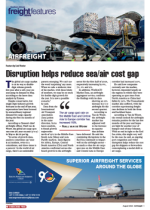E-commerce is driving change across the airfreight sector, which has recently been boosted by the ongoing conf lict in the Middle East.According to Dr André Schulz, head of the Middle East, Africa, South Asia, and CIS region at Lufthansa Cargo, airlines are having to increase investment in their f leets to meet the growing demand for e-commerce.“At Lufthansa, we have recently increased our f leet by adding four A321 freighters to service the European market. This is over and above the f leet of Boeing 777F aircraft we operate. The expansion of our f leet is due to changing customer demand and behav iour,” he told Freight News. “Customers are ordering products today from the East and expect delivery the same week. The growth of online platforms like Shein and Temu is changing the entire airfreight landscape. Massive amounts of cargo are being shipped from China to Europe as more customers move towards e-commerce.”He noted that, over the past few months, the crisis in the Red Sea had also resulted in more cargo being moved by air as ships continued to avoid the Suez Canal. With most container lines opting to reroute via the Cape, there have been delays in the supply chain.“The growing trend is the reduced waiting times for goods. Around the world, consumers want to see their goods arrive more quickly. Along with that, demand in the market has also changed and there is a definite move towards customers being more willing to pay for faster delivery.”The industry is also increasingly seeing the need for more bespoke solutions. “This is not always easy to deliver,” explained Dr Schulz. “It requires extreme f lexibility, not only from the air cargo service provider but also from the different authorities, including customs and infrastructure players. There is also increased competition between the various cargo hubs trying to service these e-commerce players. It is a very vibrant and demanding arena to operate in at present.”He said the regions he oversaw were seeing a lot of sea freight converted to airfreight, and markets like India, for example, had seen a major uptick in volumes. “India saw prices double in almost two months. It has been a rollercoaster ride and has required us to be extremely f lexible and pragmatic in our approach to allocate the necessary capacity and deliver the best solutions to our customers.”According to Dr Schulz, the African air market is continuing to perform well, with some regions doing better than others. “We have seen good demand out of East Africa in particular, with very positive effects on our yields and tonnages.”Reneé Peltzer, Lufthansa head of sales and handling for southern Africa, said hopes were high for improved performance in her region in the latter part of the year after a slow start to 2024. “We are excited to introduce some new routes which we believe will further boost volumes and significantly increase our capacity,” she said.Effective September 3, the airline will launch a Johannesburg to Munich service three times a week. “In addition, we are also introducing a daily service between Cape Town and Munich from October 27, and will continue to f ly Cape Town to Frankfurt six times a week and Johannesburg to Frankfurt daily. This significantly strengthens our position in the market.”Peltzer said demand had been increasing, and the airline had been working on developing these solutions for some time.“This is by far the strongest we have been in the South African market and showcases our commitment to growing our presence and services locally,” she said. “In Johannesburg, we will have increased our capacity by 50%.”It is not only South Africa that is being strengthened. In April, Discover Airlines, part of the Lufthansa Group, reopened its Namibia route after changing ground handlers in Windhoek, from where it now f lies daily to Frankfurt. Mauritius has also gained attention. "Discover Airlines currently f lies from the island to Frankfurt twice a week, on a Monday and a Friday,” said Peltzer. “From October 23, we will introduce our Austrian Airlines schedule from Mauritius to Vienna, operating four days a week.”

